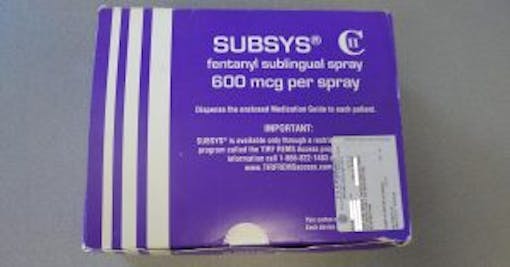John Kapoor, the 74-year-old founder and majority owner of Insys Therapeutics Inc., was arrested today and charged with leading a nationwide conspiracy to profit by using bribes and fraud to cause the illegal distribution of a fentanyl spray intended for cancer patients experiencing breakthrough pain.
'These Insys executives allegedly fueled the opioid epidemic by paying doctors to needlessly prescribe an extremely dangerous and addictive form of fentanyl.
Kapoor was arrested this morning in Arizona and charged with RICO conspiracy, as well as other felonies, including conspiracy to commit mail and wire fraud and conspiracy to violate the Anti-Kickback Law, according to a Department of Justice press release. Kapoor, the former Executive Chairman of the Board and CEO of Insys, will appear in federal court in Phoenix today. He will appear in U.S. District Court in Boston at a later date.
Leafly reported last year that Insys donated half a million dollars to the campaign to defeat adult-use cannabis legalization in Arizona.
Fentanyl is the synthetic opioid, cheaper and stronger than heroin, that’s turning North America’s opioid crisis into a catastrophe. Fentanyl is the drug that killed Prince. It’s up to 50 times more powerful than heroin. Pockets of the Midwest and Northeast are getting shredded by fentanyl. In July alone, the town of Akron, Ohio, documented nearly 300 overdoses and two dozen deaths linked to the drug. A surge in fentanyl-related overdose deaths last year forced officials in British Columbia to declare a public health emergency.

Last year federal agents arrested two Insys officials in New York state for allegedly carrying out a kickback scheme that paid physicians to encourage their patients to use fentanyl. That indictment came four months after an Insys regional manager pleaded guilty to similar charges of rigging a doctor kickback scheme in the South.
Other state attorneys general continue to investigate the company’s practices. Meanwhile, Insys has continued to report record revenues.
Cannabis Cutting Into Profits
Many saw Insys’ donations to defeat adult-use cannabis legalization—which failed in Arizona last November—as a way to keep a competing (and safer) drug out of the market. A reported 28,647 Americans died from opioid-related overdoses in 2014. In the past century, the number of people who died from cannabis overdoses is exactly zero.
In recent years, researchers have documented a clear phenomenon: In states that legalize medical marijuana, opioid usage and overdose rates decline dramatically. Patients seeking relief from chronic pain are finding medical cannabis to be a safer, cheaper, more reliable form of relief that comes without the side effects of physical addiction and possible death. Castlight Health, a California health information and technology company, found in a recent report on opioid abuse that “states with medical marijuana laws have a lower opioid abuse rate than those that don’t.”
Other Insys Officials Charged
The federal indictment unsealed today in Boston also includes additional allegations against several former Insys executives and managers who were initially indicted in December 2016.
Kapoor and Insys execs stand accused of bribing doctors and defrauding insurers.
The superseding indictment charges that Kapoor; Michael L. Babich, 40, of Scottsdale, Ariz., former CEO and President of the company; Alec Burlakoff, 42, of Charlotte, N.C., former Vice President of Sales; Richard M. Simon, 46, of Seal Beach, Calif., former National Director of Sales; former Regional Sales Directors Sunrise Lee, 36, of Bryant City, Mich., and Joseph A. Rowan, 43, of Panama City, Fla.; and former Vice President of Managed Markets, Michael J. Gurry, 53, of Scottsdale, Ariz., conspired to bribe practitioners in various states, many of whom operated pain clinics, in order to get them to prescribe a fentanyl-based pain medication. The medication, called “Subsys,” is a powerful narcotic intended to treat cancer patients suffering intense breakthrough pain. In exchange for bribes and kickbacks, the practitioners wrote large numbers of prescriptions for the patients, most of whom were not diagnosed with cancer.
The indictment also alleges that Kapoor and the six former executives conspired to mislead and defraud health insurance providers who were reluctant to approve payment for the drug when it was prescribed for non-cancer patients. They achieved this goal by setting up the “reimbursement unit,” which was dedicated to obtaining prior authorization directly from insurers and pharmacy benefit managers.
“In the midst of a nationwide opioid epidemic that has reached crisis proportions, Mr. Kapoor and his company stand accused of bribing doctors to overprescribe a potent opioid and committing fraud on insurance companies solely for profit,” said Acting United States Attorney William D. Weinreb. “Today’s arrest and charges reflect our ongoing efforts to attack the opioid crisis from all angles. We must hold the industry and its leadership accountable – just as we would the cartels or a street-level drug dealer.”
Corporate Culture of Deception, Bribery
“As alleged, these executives created a corporate culture at Insys that utilized deception and bribery as an acceptable business practice, deceiving patients, and conspiring with doctors and insurers,” said Harold H. Shaw, Special Agent in Charge of the Federal Bureau of Investigation, Boston Field Division. “The allegations of selling a highly addictive opioid cancer pain drug to patients who did not have cancer, make them no better than street-level drug dealers. Today’s charges mark an important step in holding pharmaceutical executives responsible for their part in the opioid crisis. The FBI will vigorously investigate corrupt organizations with business practices that promote fraud with a total disregard for patient safety.”
“These Insys executives allegedly fueled the opioid epidemic by paying doctors to needlessly prescribe an extremely dangerous and addictive form of fentanyl,” said Phillip Coyne, Special Agent in Charge for the Office of Inspector General of the U.S. Department of Health and Human Services. “Corporate executives intent on illegally driving up profits need to be aware they are now squarely in the sights of law enforcement.”
“As alleged, Insys executives improperly influenced health care providers to prescribe a powerful opioid for patients who did not need it, and without complying with FDA requirements, thus putting patients at risk and contributing to the current opioid crisis,” said Mark A. McCormack, Special Agent in Charge, FDA Office of Criminal Investigations’ Metro Washington Field Office. “Our office will continue to work with our law enforcement partners to pursue and bring to justice those who threaten the public health.”





